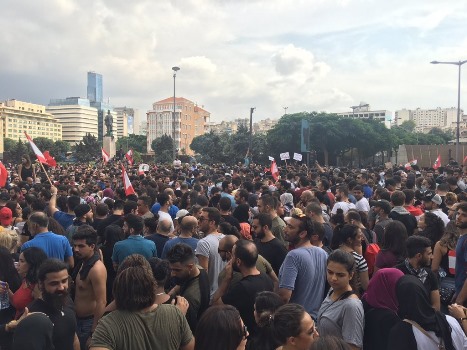
Like many countries around the world, 2021 has begun with a new lockdown being implemented across Lebanon, until the end of January. This is a result of a dramatic increase in the numbers of Covid cases across the country. There were a very limited number of cases and deaths earlier in the pandemic. Now there is a new record of infections of 4,774 over the past 24 hours (recorded on Thursday 7 January).
But this only comes on top of the ongoing political, economic and social crisis that has engulfed the country since the mass protests in October 2019 brought down the government of the then Prime Minister, Saad Hariri. Six months of technocratic government under Hassan Diab failed to resolve any of the problems of the country, with the whole government resigning following the devastating Beirut blast, in August, last year.
For the last five months, there have been ongoing talks as the sectarian Christian and Muslim parties that dominate Lebanon attempt to cobble together a new coalition to rule the country. The lack of any genuine alternative is reflected in the fact that the self-same Saad Hariri is the Prime Minister-designate trying to pull this together.
But Hariri has been to form a government due to disputes over cabinet posts between the sectarian parties. Hariri, supported by his mostly Sunni Future Movement, wishes to appoint another technocratic government beholden to him. The other major parties, the Maronite Free Patriotic Movement of President Michael Aoun, and Shia Hezbollah wish to keep control of the ministries they currently run.
While this struggle is mostly about the control of these posts and patronage for either side to hand out, these tensions have been exacerbated by a number of recent events, including the conviction of a former supporter of Hezbollah for the assassination of former prime minister Rafik Hariri (Saad’s father) and sanctions by the US being extended from figures in Hezbollah to some in the Free Patriotic Movement, including Gebran Bassil, Aoun’s son-in-law. Even French President Macron’s repeated attempts to intervene, taking a populist swipe at corruption and demanding a new government to carry out “reforms” (including cuts), has not changed the situation.
Economy shrinks by 20%
But the time to resolve the impasse is ticking down. Lebanon’s economy shrunk by 20% in 2020. Staple goods, much of which are imported, are subsidised by the state. Diab has warned that the country only has $2m in funds to maintain subsidies, which could last six months if subsidies were cut. Already, according to Medicine Sans Frontieres, “struggling to access basic food items, such as meat, chicken, and even some vegetables, due to financial issues, have become a daily reality.”
The huge anger which has seen the fall of the two governments has not gone away. But the impasse of the mass movement, due to its lack of democratic organisation and an independent working class political voice, has meant that given the desperate situation a struggle for mere survival is taking place. Covid lockdowns, like elsewhere, have a dampening effect on struggles. A survey by the Arab Opinion Index suggests 4 in 5 Lebanese aged 18-24 are considering emigrating. But to where? The Covid pandemic has devastated economies throughout the world.
Towards the end of the year, there have been reports of attacks on refugee camps, numbers of which have swelled as a result of the conflict in Syria. Around a million or so refugees are being exploited as a source of cheap labour by the construction and agriculture sectors (89% of these refugees live in extreme poverty, on less than $1 a day). On 27 December, at least three people were wounded as a refugee camp was burnt down by local youths near the town of Bhanine, with around 400 residents fleeing the camp as a result.
The new attacks that will be implemented as the sectarian parties attempt to resolve the crisis on the backs of the masses will force workers and the poor in Lebanon to fight back. The Lebanese masses have shown they can bring down governments. To end the cycle of escalating crisis requires the smashing of the current sectarian constitution and the formation of a genuinely independent political party of the Lebanese working class that can galvanise the masses’ anger to fight for a workers’ and poor peoples’ government that will implement a socialist solution.
